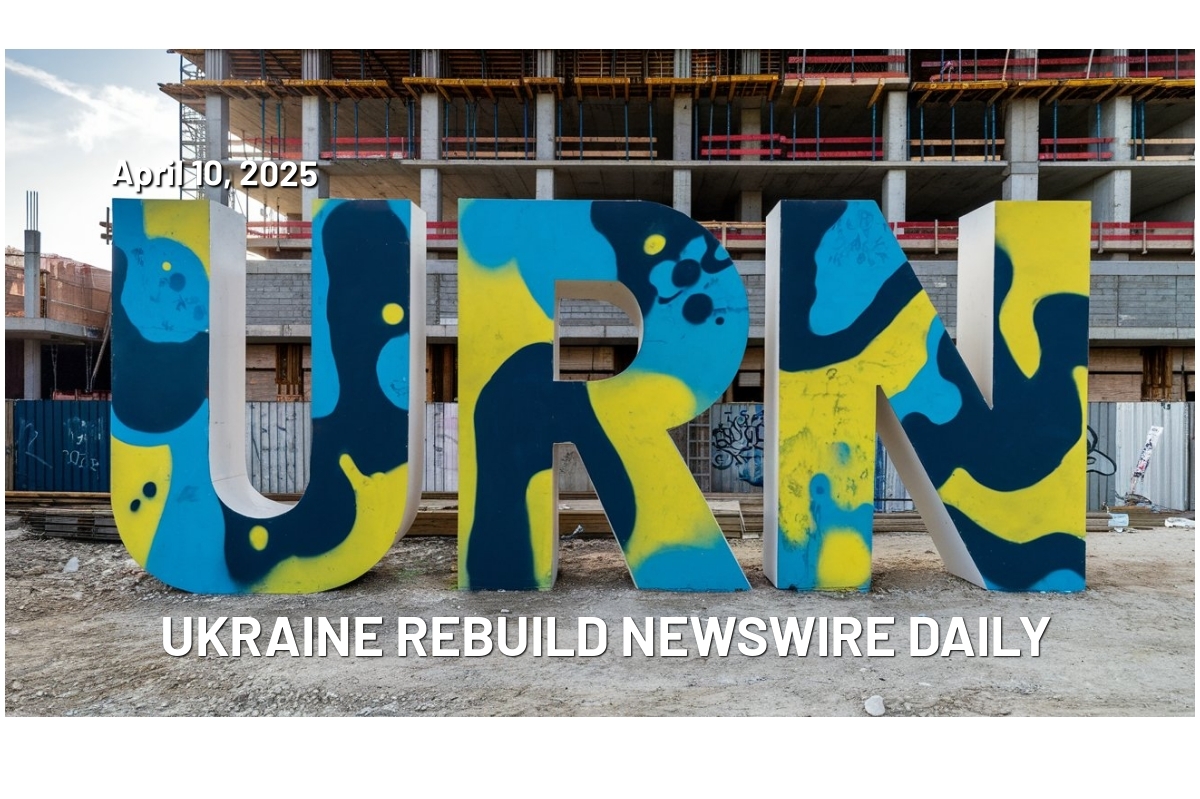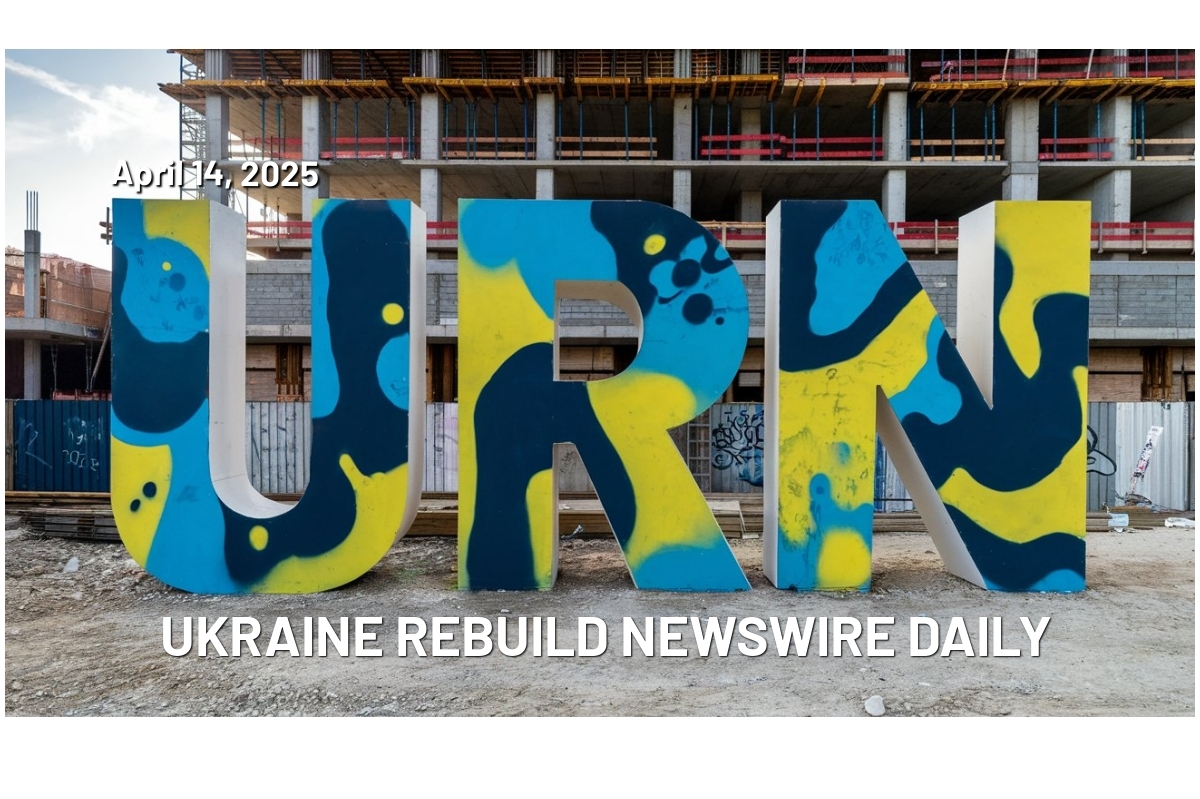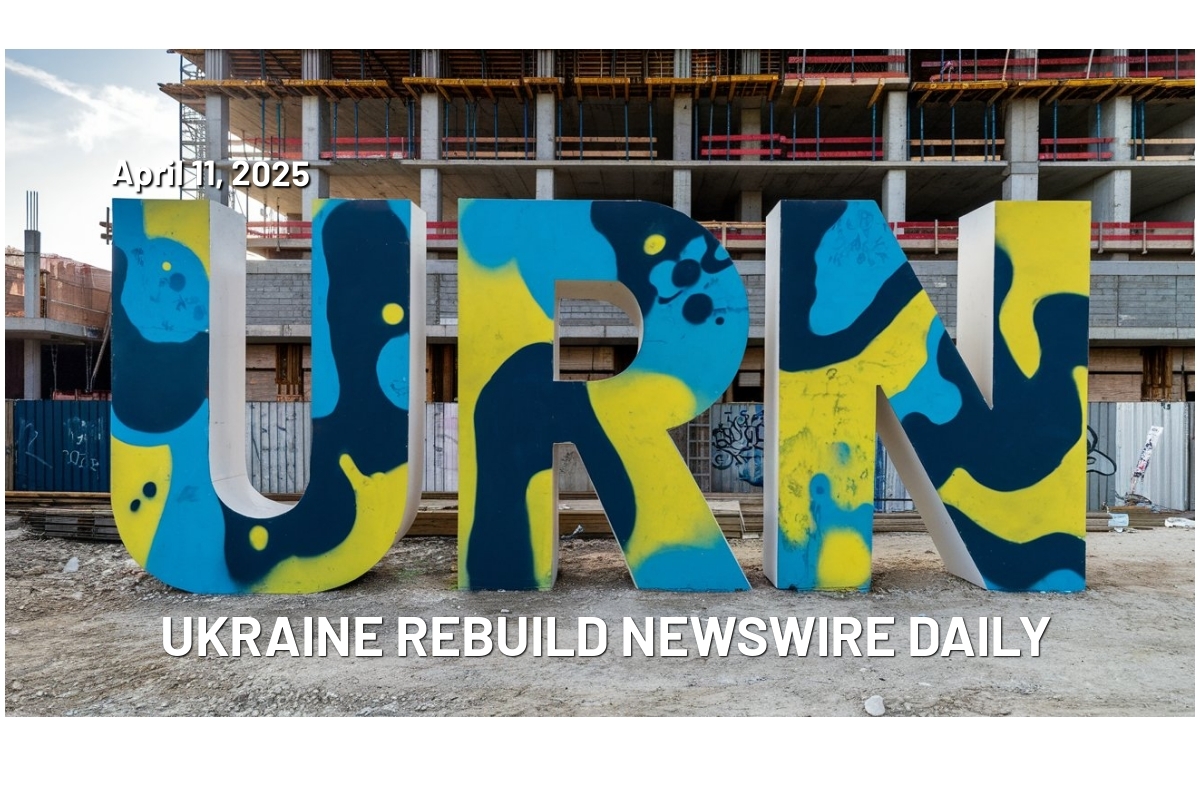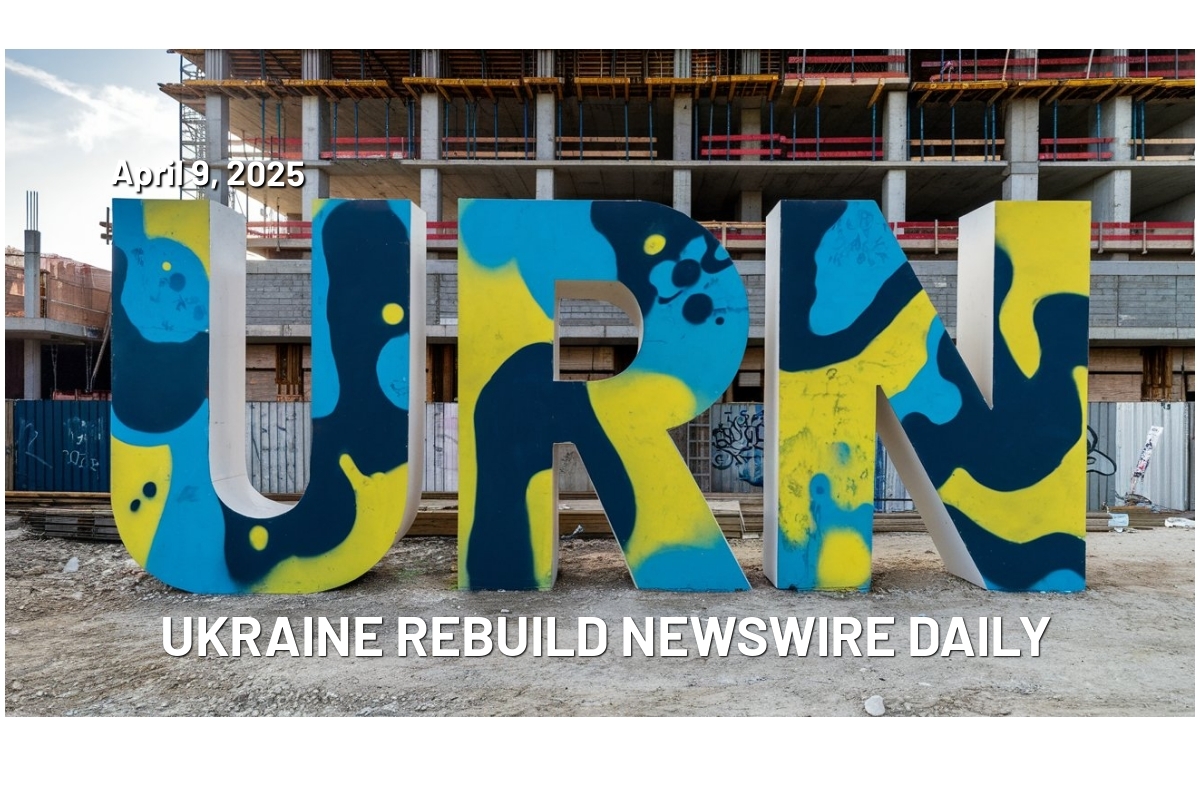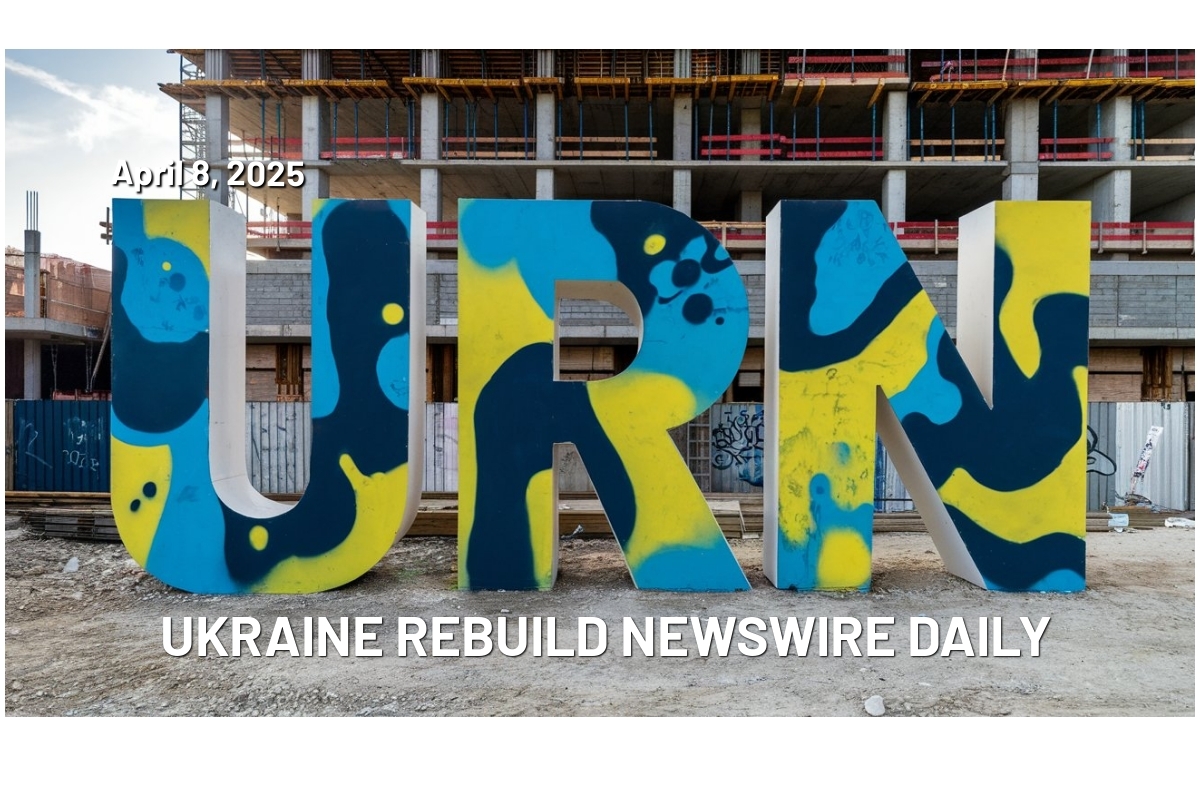Today's Contents
Just The Facts:
- Ukraine signs loans worth €300 million with European Investment Bank
- Ukraine finalizes position on US minerals deal, foreign minister says
- EU transfers €1 billion to Ukraine in third tranche under G7 ERA initiative
- Naftogaz mulls energy, digitalization partnership with Bergen Engines, Itera
Here's What They Think:
- CSO: Ukraine is a good example of cyber resilience
- Responsible Statecraft: Temporary ceasefire in Ukraine serves no purpose
Sober Second Thought:
- A G7-led fund is key to rebuilding Ukraine and setting global standard for recovery, Think7 policy brief says
The Rebuilders' Social
- Update on works at the Ukrainian-Romanian border, French help for Chernihiv, and UkraineInvest signs agreement with Zammler Group to attract infrastructure investment.

Ukraine signs loans worth €300 million with European Investment Bank
Ukraine's Prime Minister Denys Shmyhal on Wednesday signed loan agreements with the European Investment Bank (EIB) President Nadia Calviño worth a total of €300 million for three previously announced projects.
The package includes €100 million in funding for the Ukraine Recovery III project to support community recovery and development projects; €100 million for the Ukraine Water Recovery project that will provide financing to repair water supply and wastewater treatment systems damaged by the war, and €100 million for Ukraine District Heating project that will be implemented in cooperation with Ukreximbank, which will act as an intermediary bank for on-lending to local authorities to restore district heating infrastructure.
"This is not only about rebuilding what has been destroyed, but also about creating modern, resilient, and energy-efficient infrastructure. Each of the projects launched today is an investment in the development of Ukrainian communities, the stability of our economy, and the secure European future of our nation," Shmyhal said during the signing ceremony.
Since the Russian full-scale invasion in February 2022, the EIB has disbursed €2.2 billion to support Ukraine's recovery and reconstruction.
In March, the EIB and the European Commission signed a guarantee agreement that will allow the lender to invest at least €2 billion in urgent recovery and reconstruction projects in Ukraine.
That funding is part of the European Union's €50 billion Ukraine Facility, the Union's financial assistance program for the country, for the period 2024-2027.
Ukraine finalizes position on US minerals deal, foreign minister says
Ukraine's Foreign Minister Andrii Sybiha said on Tuesday that Kyiv has already developed its position on the mineral resources deal with the US and its vision of the text.
"We have already developed our position, as well as our vision regarding the text of the future agreement," Sybiha told Ukraine's state news agency Ukrinform.
Sybiha said Ukraine will soon finalize its negotiating team, which is set to travel to Washington for talks on the draft agreement.
He emphasized that the deal must be mutually beneficial, align with the interests of both sides, and remain consistent with Ukraine's path toward European integration.
"This is one of the principled positions for the Ukrainian side," Sybiha said, adding that a leading law firm will be chosen to support the negotiation process.
Also on Tuesday, Ukraine's government said it has allocated $2.73 million from the state budget to contract consultants from "leading international law firms" to help prepare the country's negotiating position in talks with the US.
On Monday, Ukraine's Economy Minister Yulia Svyrydenko said that the government will this week send a delegation to Washington to advance negotiations on the minerals deal.
The latest US proposal would require Kyiv to send the US all profit from a fund controlling Ukrainian resources until Ukraine repays all US wartime aid, plus interest, according to a summary reviewed by Reuters.
Ukraine's President Volodymyr Zelensky was meant to sign an earlier version of the deal in Washington on February 28. The signing was postponed following a tense exchange between him and Trump in the Oval Office.
EU transfers €1 billion to Ukraine in third tranche under G7 ERA initiative
The European Commission said on Wednesday it has transferred an additional €1 billion loan to Ukraine under its Macro-Financial Assistance (MFA) program, which is to be repaid with proceeds from Russian assets frozen in the European Union.
The payment marks the third allocation to Ukraine under the €18.1 billion MFA, bringing the total disbursed so far to €5 billion, the EC said in a press release.
The MFA loan represents the EU's contribution to the G7-led Extraordinary Revenue Acceleration (ERA) initiative, which aims to deliver €45 billion in financial support to Ukraine.
This funding helps cover Ukraine's urgent budgetary needs, which have increased due to Russia's ongoing war of aggression. It will support the country's military and reconstruction efforts, including repairs to vital infrastructure such as energy, water, and transport systems, the EC said.
"The Commission stands ready to frontload the remaining MFA funds in line with the country's needs," the statement read.
The EC allocated the previous tranche, also worth €1 billion, to Ukraine last month.
The EC also said that the EU had received €2.1 billion in revenue from immobilised Russian assets, which will be channelled via the European Peace Facility and the Ukraine Facility to support Ukraine's defence capabilities and the country's recovery and reconstruction.
Naftogaz mulls energy, digitalization partnership with Bergen Engines, Itera
Ukrainian state oil and gas company Naftogaz said it is considering collaborating with Bergen Engines, a Norwegian developer of medium-speed engines, and Itera, a Scandinavian IT company specializing in sustainable digital transformation, in energy and digital technologies.
The announcement follows a meeting between Naftogaz CEO Roman Chumak, Bergen Engines CEO John Erik Rov, and Itera COO Jon Erik Hogberg.
The three explored opportunities to digitalize natural gas production in Ukraine by leveraging advanced IT solutions, data analytics, and cloud technologies to enhance well efficiency.
Rov and Hogberg visited Naftogaz's headquarters in Kyiv to deliver gas reciprocating units that will help provide heat and electricity to two major Ukrainian cities during the upcoming heating season, as per the statement.
"We appreciate this high-tech equipment, which will strengthen the energy resilience of our communities. Amid constant attacks on Ukraine's energy infrastructure, reliable backup power is not just equipment — it’s a guarantee of warmth and light for Ukrainian homes," Chumak said.
Separately, Chumak said on Wednesday that Naftogaz had restored 50% of its gas production capacity damaged during Russian long-range strikes in February, as quoted by Reuters.

CSO: Ukraine is a good example of cyber resilience
Ukraine is a strong example of cyber resilience as the country managed to learn over more than a decade of conflict that when systems fail, having a plan in place to restore lost resources is essential, Christopher Burgess, a former senior security advisor to Cisco, wrote in an op-ed for CSO.
Preparing for worst-case scenarios, like a service provider failing, a major disaster, or an insider threat, doesn't mean expecting the worst - it's a smart and careful approach. Ukraine's resilience over the past decade shows just how important this kind of planning can be, Burgess wrote.
Responsible Statecraft: Temporary ceasefire in Ukraine serves no purpose
A temporary ceasefire in Ukraine would be ineffective and potentially harmful, and while the Trump administration may have supported it with good intentions and the Putin administration for self-serving reasons, the result would be the same: no real progress toward peace, Anatol Lieven, director of the Eurasia Program at the Quincy Institute for Responsible Statecraft, wrote in an op-ed.
The tragic missile strike in Krivyi Rih, killing 20 people, including nine children, highlights the urgent need for peace. But a brief ceasefire would only delay real solutions and risk locking in a dangerous status quo, so a full and lasting peace must be the goal, Lieven argued.

A G7-led fund is key to rebuilding Ukraine and setting global standard for recovery, Think7 policy brief says
The G7 group of countries should lead Ukraine's reconstruction by establishing a dedicated fund for Ukraine's recovery to ensure the country's long-term economic resilience, sustainable development, and democratic rebuilding, Tinatin Akhvlediani, a research fellow in the EU Foreign Policy Unit at the Centre for
European Policy Studies (CEPS), wrote in a policy brief for Think7, the G7's official engagement group that aims to provide evidence-based advice and policy recommendations to the G7 Presidency.
Rather than relying on one-time grants, this fund should operate as a revolving financial mechanism that reinvests repayments to grow over time. This approach not only secures ongoing support for Ukraine but also provides a structure for unlocking frozen Russian assets, worth an estimated $300 billion, to finance recovery without burdening taxpayers, Akhvlediani wrote.
The fund would create a self-sustaining model for post-conflict recovery and establish a precedent for holding aggressor states accountable, in line with international law, the author said, noting the recovery process must go beyond rebuilding infrastructure: it should prioritize green transition, digitalization, and human capital revitalization to create a future-proof Ukrainian economy.
According to the World Bank's 2024 Rapid Damage and Needs Assessment, Ukraine's reconstruction and recovery needs reached approximately $486 billion by the end of 2023. While early international assistance has focused on urgent needs, long-term reconstruction requires a more structured, multilateral funding mechanism, Akhvlediani argued.
The proposed G7 fund would draw lessons from Germany's use of Marshall Plan funds, where aid was issued as loans with interest rather than direct transfers. This system allowed funds to be recycled and expanded over time. Ukraine could establish a similar agency to manage the disbursement of medium- to long-term loans, particularly for high-risk development and infrastructure projects. Interest and principal repayments would be reinvested to sustain the fund's growth, as per the policy brief.
In addition to public funding, private sector engagement is essential for Ukraine's recovery. Sectors like digital innovation, renewable energy, and resilient infrastructure offer high-return investment opportunities. However, security and financial risks remain a major barrier. The G7 should provide tailored support, such as security guarantees, insurance mechanisms, and investment incentives, to encourage business participation, Akhvlediani wrote.
Ultimately, the G7 must use its influence and capacity to shape a coordinated, transparent, and effective recovery model for Ukraine. This includes working closely with the Multi-Donor Coordination Platform and expanding partnerships with like-minded nations such as Australia, South Korea, India, and New Zealand to ensure long-term support and global solidarity.
Ukraine's recovery is more than a national priority—it is a chance for the international community to show how democracy, sustainability, and accountability can prevail after war, Akhvlediani wrote, adding that by taking decisive leadership through the G7 fund, the G7 can help Ukraine rebuild stronger while creating a global template for future reconstruction efforts in regions like Syria or Gaza.

Social Media Posts
Romania-Ukraine Border Works
Serhiy Derkach, deputy minister for communities, territories and infrastructure development of Ukraine, recapped a meeting with Romanian officials about developing their common border.
"👉 The main focus was the expansion and modernization of road border crossings.
Enhancing the capacity of the border with Romania is a strategic priority. We are working on both upgrading existing BCPs and opening new ones."
☝️ Our immediate priorities include the opening of the new Bila Tserkva–Sighetu Marmației crossing — where the Romanian side has already completed the bridge and over 65% of the overall construction — as well as launching passenger bus traffic through Dyakivtsi–Racovăț."
Zammler Group to Help Seek Infrastructure Investment
UkraineInvest, the state investment promotion agency, said it signed a coooperation agreement with Ukrainian third-party logistic operator Zammler Group aimed at attracting large investments in the country's infrastructure.
"The aim of the project is to create a proprietary logistics centre that meets the highest international standards. In addition to traditional warehousing services, the centre will offer fulfilment solutions – a full cycle of logistics operations for e-commerce companies, including order processing, packaging and last-mile delivery."
French Help for Chernihiv
Pierre Heilbronn, France's envoy for the reconstruction of Ukraine, recapped his country's actions for the northern Ukrainian oblast of Chernihiv since Ukrainian President Volodymyr Zelensky specifically called for help for the region at the Conference of Lugano in 2023.
"👩🏫🏥🛣️ Schools, hospitals, universities, roads, public administration are benefiting from France’s support, under the leadership of Ministère des Affaires étrangères français and Expertise France. Small in scale, considering the needs, but essential to recovery. Geographically delimited, but driven by clear vision: a grassroot approach aiming at Ukraine’s gradual integration into the 🇪🇺."

URN Daily: Sense Bank and Ukrgasbank for sale? And US seeks to cancel $4.7 billion of Ukraine's debt

